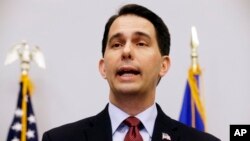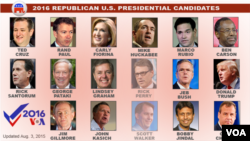Republican Scott Walker has suspended his U.S. presidential campaign, effectively ending an eight-week formal push that saw him sink from near-frontrunner status to political insignificance in the key campaign state of Iowa.
Analysts and insiders attributed the Wisconsin governor's decision to a lack of funding, as he crisscrossed Iowa and sought support for the Republican nomination in other key states seen as favoring his conservative message.
But Monday, Walker said he had become disillusioned with the Republican race, and that the overall campaign had "drifted into personal attacks." He did not offer details. But in a thinly veiled swipe at leading candidate Donald Trump, Walker called on the remaining candidates to develop "a positive, conservative alternative to the current frontrunner."
Walker gained national attention in 2012, after his successful push to decertify public worker unions in his home state, and later for surviving a recall election largely organized and backed by disgruntled public workers and their supporters. But his campaign, launched in July, failed to gain traction nationally, and several recent surveys showed him favored by fewer than 5 percent of likely voters in Iowa.
In other developments, a U.S.-based Islamic civil liberties group on Monday called for one of the leading Republican candidates, former neurosurgeon Ben Carson, to quit his campaign after he said he would never support a Muslim presidential candidate.
Nihad Awad, executive director of the Council on American-Islamic Relations, said that Carson, a devout Christian, should withdraw "because he's unfit to lead because his views are in contradiction with the United States Constitution."
Awad noted that the Constitution says "no religious test shall ever be required as a qualification" for U.S. public office.
"This cannot be misunderstood ... this is a very clear language to all Americans, to all generations, irrespective of who they are," Awad said at a news conference.
Carson told NBC's Meet the Press on Sunday, "I would not advocate that we put a Muslim in charge of this nation. I absolutely would not agree with that."
He said a president's faith should matter to voters and he described the Islamic faith as inconsistent with the U.S. Constitution, although he did not specify in which way Islam runs counter to constitutional principles.
Carson's comments came amid lingering fallout over Republican Donald Trump's refusal last week to take issue with a man who, during a New Hampshire campaign event, wrongly called President Barack Obama a Muslim and said Muslims are "a problem in this country."






